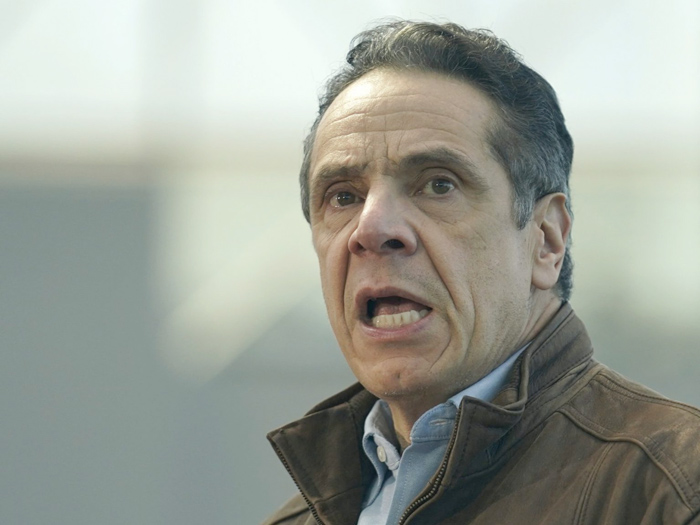sexual harassment allegations
New York Gov. Andrew Cuomo resigned Tuesday amid accusations of sexual harassment, inappropriate behavior and undercounting COVID-19 deaths connected to nursing homes.
After an investigation from the attorney general’s office determined Cuomo had sexually harassed 11 women — in and out of state government — the governor was initially defiant. He appeared to reject calls to resign, but announced Tuesday he would step down so that the government could focus on COVID-19 pandemic recovery without the distraction of a lengthy impeachment trial.
“New York tough means New York loving, and I love New York and I love you,” Cuomo said. “I would never want to be unhelpful in any way, and I think given the circumstances, the best way I can help now is if I step aside and let government get back to governing, and therefore, that’s what I’ll do.”
The resignation will go into effect Aug. 24, at which point Democratic Lt. Gov. Kathy Hochul will take over as governor for the remainder of Cuomo’s term.
“Kathy Hochul, my lieutenant governor, is smart and competent. This transition must be seamless. We have a lot going on, I’m very worried about the delta variant, and so should you be, but she can come up to speed quickly,” Cuomo said.
Hochul released a statement shortly after Cuomo’s resignation, saying she agreed with the governor’s decision to step down.
“It is the right thing to do and in the best interest of New Yorkers,” Hochul said. “As someone who has served at all levels of government and is next in the line of succession, I am prepared to lead as New York State’s 57th Governor.”
Cuomo also thanked the members of his administration for making New York “the progressive capital of the nation.”
“No other state government accomplished more to help people,” Cuomo said, noting marriage equality, tough gun safety laws, raising the minimum wage, and managing every emergency “Mother Nature could throw at us.”
Embroiled in controversy and facing a state impeachment inquiry, Cuomo quickly became politically isolated amid growing calls for his resignation from state and federal lawmakers, including previous allies President Joe Biden and New York’s U.S. Sens. Chuck Schumer and Kirsten Gillibrand.
Cuomo was already facing backlash for his administration’s undercounting of pandemic-related nursing home fatalities when a former aide, Lindsey Boylan, elaborated on harassment allegations she first made in December 2020.
Boylan said Cuomo subjected her to an unwanted kiss and comments about her appearance.
Soon after, another former employee, 25-year-old Charlotte Bennett, said Cuomo, 63, questioned her about her sex life, talked about being lonely and asked if she would be open to a sexual relationship with an older man.
Over the ensuing weeks, five more women came forward with accusations of inappropriate behavior by Cuomo. Attorney General Letitia James’ investigation determined Cuomo had harassed 11 women in total.
James on Tuesday said Cuomo’s resignation “closes a sad chapter for all of New York.”
“I thank Governor Cuomo for his contributions to our state. The ascension of our Lieutenant Governor, Kathy Hochul, will help New York enter a new day. We must continue to build on the progress already made and improve the lives of New Yorkers in every corner of the state. I know our state is in good hands with Hochul at the helm, and I look forward to continuing to work with her,” James said.
The firestorm around the governor grew after the Times Union of Albany reported in March that an unidentified aide told a supervisor Cuomo reached under her shirt and fondled her at his official residence late last year.
The woman, Brittany Commisso, filed a criminal complaint last week and the Albany County Sheriff’s Office launched an investigation.
The embattled politician insisted that he never touched anyone inappropriately and repeatedly said he’s sorry if he ever made anyone uncomfortable.
Yet Cuomo’s coalition of critics expanded geographically and politically, covering virtually every region in the state and the political power centers of New York City and Washington, even before the attorney general’s report was released.
The state Assembly greenlit an impeachment investigation on March 11 as lawmakers investigated whether there were grounds for Cuomo’s forcible removal from office.
Prior to the harassment accusations, the Queens-born politician faced backlash for an alleged February tirade against New York Assemblyman Ron Kim, who questioned the governor’s handling of COVID-19 in state nursing homes.
The state lawmaker called Cuomo an “abuser” in an interview with the PIX11 Morning News after Cuomo allegedly threatened to ruin Kim’s career if he did not fall in line with the governor.
Kim was among several officials who called for an investigation into the Cuomo administration’s alleged coverup of COVID-19 nursing home fatalities during the pandemic.
The governor’s resignation came more than a year after his daily televised coronavirus briefings won him local and national adoration for his handling of the pandemic.
Cuomo, who is the son of former New York Gov. Mario Cuomo, served as governor for just over 10 years, assuming office in January 2011.
His current term, his third after being re-elected in 2018, would have ended in January 2023.
also read :
Kris Wu facing more date rape lawsuits – #MeToo movement
Andrew Cuomo To Resign After Investigation Finds He Sexually Harassed Multiple Women
New York Gov. Andrew Cuomo has announced he will resign following a scathing report from the state’s attorney general concluding the third-term Democrat sexually harassed 11 women, and in one instance, sought to retaliate against one of his accusers who went public with her allegations.
“Wasting energy on distractions is the last thing that state government should be doing, and I cannot be the cause of that,” Cuomo, 63, said in remarks Tuesday from the state capital of Albany.
“I think that, given the circumstances, the best way I can help now is if I step aside and let government get back to governing,” he added.
Lt. Gov. Kathy Hochul is next in line and will become the state’s first female governor.
“This transition must be seamless,” Cuomo said, calling Hochul smart and competent. “She can come up to speed quickly.”
Hochul, who served one term in Congress before Cuomo tapped her to be his running mate in 2014, said in a statement she agreed with the governor’s decision to step down.
“It is the right thing to do and in the best interest of New Yorkers,” she said. “As someone who has served at all levels of government and is next in the line of succession, I am prepared to lead as New York state’s 57th governor.”
Cuomo will leave office on Aug. 24
Cuomo’s departure from office, which will take effect in 14 days, represents a remarkable turn of events from just over a year ago when the governor was seen as a rising star in the Democratic Party for his administration’s response to the coronavirus pandemic. Yet even that performance is now under a cloud of scrutiny as a separate investigation by the attorney general found that the number of nursing home deaths in the state was far worse than officials disclosed.
But it was the allegations of harassment that precipitated the once unthinkable prospect of Cuomo’s resignation. The 165-page report released last week followed a months-long investigation into Cuomo’s actions and outlined what New York Attorney General Letitia James called violations of both state and federal law. Prosecutors said their findings substantiated allegations from several women — which included unwanted and nonconsensual touching, groping, kissing and sexual comments.
“This is a sad day for New York because independent investigators have concluded that Governor Cuomo sexually harassed multiple women and, in doing so, broke the law,” James said upon the report’s release. “No man – no matter how powerful – can be allowed to harass women or violate our human rights.”
In a statement after Cuomo’s announcement, James said the governor’s resignation “closes a sad chapter for all of New York, but it’s an important step towards justice.”
It’s a stunning fall for Cuomo, a political scion whose last name is like royalty in New York. His father, Mario, a former three-term governor, is revered in the state. The governor’s resignation will mark an end to a nearly half-century political dynasty. There has been a Cuomo in statewide or federal office for 40 of the last 46 years.
In his remarks Tuesday, Andrew Cuomo repeatedly denied the allegations against him and called the report “false.” The most serious allegations, he said, “had no credible factual basis.”
He then apologized for offending the women who were included in the report and said he took “full responsibility” for his actions.
“I have been too familiar with people. My sense of humor can be insensitive and off-putting. I do hug and kiss people casually, women and men. I have done it all my life,” Cuomo said.
“In my mind, I’ve never crossed the line with anyone, but I didn’t realize the extent to which the line has been redrawn.”
Multiple women spoke out publicly against Cuomo
Since February, at least seven women have come forward to recount unwelcome interactions with Cuomo, including several former aides.
Among them is Jessica Bakeman, who said in a New York magazine essay published in March that the governor touched her inappropriately while she was a statehouse reporter several years ago. Bakeman now works at an NPR member station in Florida.
Her account followed accusations from a Cuomo aide who said the governor had groped her late last year. In interviews last week with CBS and the Times Union of Albany, the aide, Brittany Commisso, said she was called to Cuomo’s office in the Executive Mansion to help with a technical problem with his mobile phone. Once she arrived, he began groping her, she alleged.
Commisso’s allegations were originally published by the Times Union in April under the condition that she remain anonymous.
An attorney for the governor, Beth Garvey, said the state had an obligation to report those allegations and did so when the complainant declined to do it.
Following the Times Union revelation, the speaker of the New York State Assembly, Carl Heastie, authorized the assembly’s Judiciary Committee to open an impeachment investigation into the misconduct allegations against Cuomo.
Another woman, Anna Ruch, shared her story with The New York Times. Ruch told the Times in March that she met Cuomo during a wedding reception in September 2019. Ruch said that Cuomo put his hand on her bare lower back and that after she removed his hand, he then placed both hands on her cheeks and asked if he could kiss her. A friend nearby photographed the interaction, and Ruch shared the photos with the newspaper.
Calls to resign have been growing from within his own party
Following publication of Ruch’s story, U.S. Rep. Kathleen Rice called for Cuomo to quit. She was the first Democrat in New York’s congressional delegation to do so.
In the months since, every member of the state’s congressional delegation has followed suit, including Reps. Jerry Nadler and Alexandria Ocasio-Cortez. So too did the state’s two U.S. senators — Majority Leader Chuck Schumer and Kirsten Gillibrand.
President Biden also said Cuomo should resign if the investigation confirmed the women’s allegations.
“I think he’ll probably end up being prosecuted, too,” Biden told ABC News in March.
Speaking to reporters on Tuesday, Biden said he “respects” Cuomo’s decision to resign.
When asked about Cuomo’s performance as governor, Biden attempted to separate the New Yorker’s personal behavior from his official duties, saying: “He’s done a hell of a job,” citing voting access and infrastructure. “That’s why it’s so sad,” Biden added.
Pressed on whether it was appropriate to separate Cuomo’s achievements as governor from the numerous allegations of sexual harassment, Biden said he was trying to answer specifically when asked about the governor’s performance.
After the attorney general’s report was released Aug. 3, Biden confirmed that he believed Cuomo should step down. “I think he should resign,” Biden told reporters at the White House then.
Ruch’s allegations followed statements in February from two former aides: Lindsey Boylan, a onetime economic adviser to Cuomo, and Charlotte Bennett, who was an executive assistant and health policy adviser for the governor.
Boylan described an unwanted kiss and touching from the governor amid “a culture within his administration where sexual harassment and bullying is so pervasive that it is not only condoned but expected.”
Bennett told The New York Times that the governor had asked her a series of personal questions when she was alone with him in his office, including whether she ever had sex with older men.
Cuomo also faced backlash over nursing home deaths
On top of the harassment accusations, Cuomo has also faced pressure over not publicly disclosing the full number of people who died of COVID-19 in nursing homes in the state.
The state attorney general issued a report in January that found Cuomo’s administration undercounted the nursing home deaths by 50% because it didn’t include many residents who became sick with COVID-19, were transferred to a hospital and died there.
Cuomo has had a long history in politics
Cuomo has been involved in politics for most of his life. Arguably, politics has been more a part of his life than even his father’s.
He got his start in politics as a volunteer on his father’s campaign for lieutenant governor when he was 16. In 1982, at 24, he was campaign manager for his father’s first successful run for governor.
When his father was governor, Cuomo then started a nonprofit in the 1980s to help build housing for the homeless, which drew the attention of national political figures.
By the 1990s, Cuomo was secretary of housing and urban development in Bill Clinton’s administration. And he was married to Kerry Kennedy in a marriage the New York tabloids dubbed “Cuomolot,” a play on Camelot, which the Kennedy dynasty is sometimes called.
Cuomo returned to New York in 2000 and soon launched a campaign against Republican Gov. George Pataki, the man who unseated his father and denied Mario Cuomo a fourth term.
The campaign, though, was a bust. He lost in the Democratic primary, and Pataki won reelection. After the loss, Cuomo’s marriage fell apart, too. It was a time he called the low point of his life.
But by 2006, he was back. He ran and won as state attorney general, mapping out his arc to the governorship. He was elected governor in 2010, and was serving his third term, seeking his fourth, at the time he announced his resignation.
Only one person has won four terms as New York state governor — Nelson Rockefeller, who went on to serve as Gerald Ford’s vice president in 1974.
Andrew Cuomo’s fall serves as a warning for other governors whose flaws are magnified in the Covid spotlight
New York Gov. Andrew Cuomo’s fall from grace — unthinkable a year ago — serves as a warning for other governors caught in a once-in-a-lifetime pandemic: The crisis has offered a chance to build their national profiles, but it has also magnified their own flaws and appetites for risk.
Yet Cuomo, felled by a sexual harassment controversy that appears to be an expression of his own ego and hubris, is now a cautionary tale for those other top governors in the white-hot glare of Covid-19’s leadership test. The moment they seem most powerful can become the moment of greatest political peril as the pandemic ignores election cycles and vexes voters who are accustomed to throwing underperforming national and local leaders out of office.
Before scandal struck, Cuomo was often discussed as a potential contender for the White House as his determined, empathetic oratory shaped his image as a man ready to meet the crisis and offer reassurance to a nation terrified of an invading, invisible virus. And he wasn’t the only governor whose stewardship of one of the grimmest moments in modern history sparked presidential speculation.
Decisions by Republican Govs. Ron DeSantis of Florida and Greg Abbott of Texas and Democratic California Gov. Gavin Newsom, for instance, cannot be understood without the backstory that all, once or still, were onstage as potential contenders in their parties for the presidency.
Andrew Cuomo’s fall serves as a warning for other governors whose flaws are magnified in the Covid spotlight
New York Gov. Andrew Cuomo’s fall from grace — unthinkable a year ago — serves as a warning for other governors caught in a once-in-a-lifetime pandemic: The crisis has offered a chance to build their national profiles, but it has also magnified their own flaws and appetites for risk.
Yet Cuomo, felled by a sexual harassment controversy that appears to be an expression of his own ego and hubris, is now a cautionary tale for those other top governors in the white-hot glare of Covid-19’s leadership test. The moment they seem most powerful can become the moment of greatest political peril as the pandemic ignores election cycles and vexes voters who are accustomed to throwing underperforming national and local leaders out of office.
Before scandal struck, Cuomo was often discussed as a potential contender for the White House as his determined, empathetic oratory shaped his image as a man ready to meet the crisis and offer reassurance to a nation terrified of an invading, invisible virus. And he wasn’t the only governor whose stewardship of one of the grimmest moments in modern history sparked presidential speculation.
Decisions by Republican Govs. Ron DeSantis of Florida and Greg Abbott of Texas and Democratic California Gov. Gavin Newsom, for instance, cannot be understood without the backstory that all, once or still, were onstage as potential contenders in their parties for the presidency.
Andrew Mark Cuomo
(/ˈkwoʊmoʊ/; Italian: [ˈkwɔːmo]; born December 6, 1957) is an American lawyer, author, and politician who has served as the 56th governor of New York since 2011.
A member of the Democratic Party, he was elected to the same position his father, Mario Cuomo, held for three terms, and he is the brother of CNN news anchor Chris Cuomo.
Born in Queens, New York City, Cuomo is a graduate of Fordham University and Albany Law School.
He began his career working as the campaign manager for his father in the 1982 New York gubernatorial election, then as an assistant district attorney in New York City before entering private law practice. He founded a housing non-profit and was appointed chair of the New York City Homeless Commission by New York City Mayor David Dinkins, a position he held from 1990 to 1993.


















